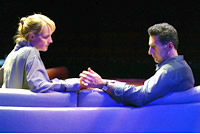 Come
Again?
Come
Again?
By Jonathan Kalb
Life (x) 3
By Yasmina Reza
Circle in the Square
1633 Broadway at 50th St.
Box Office: (212) 239-6200
Yasmina Reza's Life (x) 3 is a
play that keeps starting over. It presents three different versions
of the same disastrous evening in a Paris apartment, when an astrophysicist
named Henry (John Turturro) and his lawyer wife Sonia (Helen Hunt)
are trying to get their six-year-old settled for the night and
dinner guests arrive who were expected for the following evening.
A few other playwrights have worked this vein before, by which
I mean the device of repeating the same scene in different variations,
not the unbelievably shopworn circumstance of a dinner party that
never gets going. J.B. Priestley, Alan Ayckbourn, Michael Frayn,
and Caryl Churchill have all experimented, variously, in déjà
vu by design, and all have wedded the device to interesting
themes and ideas. Reza, by contrast, leaves one seriously suspecting
that she cobbled together the false starts of a draft she couldn't
finish and served them up as a half-baked meditation on relativity.
But perhaps it's unfair to start this way. Let me take that again.
Yasmina Reza's Life (x) 3 is a
play that keeps starting over. In the smoothly bland production
that recently opened at Circle in the Square, directed by Matthew
Warchus (who also directed the critically acclaimed London production
of 2000), it is spiced up between scenes with a really cool blue-laser-cube
effect that flashes to loud music while the round rug-and-couch
set revolves to show different perspectives (design by Mark Thompson).
The play does win early points for realism as Turturro and Hunt
find numerous subtle shadings in a nasty spat over parental values
provoked by their exasperating six-year-old. That plausibility
doesn't last long, though, as all the rest of the squabbling and
backbiting that follow in the first scene are worthy of the laser
cube and strongly reminiscent of the utterly incredible screaming
fits between straight, self-contained guy-guy friends in Reza's
slick 1998 Broadway hit Art.
The matchup with the visiting couple is
pure sitcom. Hubert (Brent Spiner), a smug senior scientist whose
recommendation Henry needs for promotion, badgers his wife Inez
(Linda Emond) with tritely boorish insults, making it laughable
that a self-possessed beauty like Sonia would ever fall for him.
Meanwhile, Hubert harbors casual malice toward Henry. Knowing
that the latter hasn't published in three years, Hubert drops
the bombshell that the paper he's staked his future on has probably
been scooped by Mexican scientists. The only apparent motive for
this malice is the provocation of snickers among anti-intellectual
spectators thrilled by the circumstance's exaggerated publish-or-perish
terror. Other would-be metaphysical mysteries include: why do
the guests decide to stay and munch Cheeze-Its and chocolate fingers
rather than reschedule the dinner? And why don't their hosts,
both worldly professionals, think of ordering take-out? But perhaps
I've rushed to judgement. Let me try again.
Because Yasmina Reza's Life (x) 3
is a play that keeps starting over, with mostly unremarkable dialogue
by indifferently conceived characters who occasionally wax astrophysical,
the only source of clues to its putative larger game is in the
differences between the scenes. The second time through, the scenario
is just as implausible, with Henry getting sloppily drunk and
aggressive, and Hubert defending himself well enough until much
maligned Inez points up his disingenuousness and leaves the party
in hysterical tears. The third variation takes a wholly new contemplative
tone, beginning with a sweeping philosophical monologue by Hubert
regarding the humane grandeur of cosmological study and integrated
scientific knowledge and continuing with a manic-depressive collapse
into melancholy on Henry's part. Hubert drops his news about the
Mexicans, but Henry takes it with equanimity and we learn later
that it's not career-shattering after all. In a casual inspection
of the nature of manic depression, we find out that neither Hubert's
two-facedness nor Sonia's infidelity are really the cause
of Henry's depression.
The implication (supporting my earlier
surmise) is that Reza had no deeper subject to begin with but
eventually found one that felt hip and philosophical enough to
suffice as content for those who don't look or listen too hard:
randomness. Often, things go wrong without anyone being able to
say exactly why. Eureka! Life (at least when replicated three
times) isn't a melodrama or a sitcom. As Henry says about his
research on "the shape of dark-matter halos," sometimes an object
really is as flat as it looks, even when scores of intelligent
people insist that must be three-dimensional.
